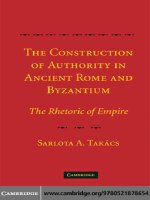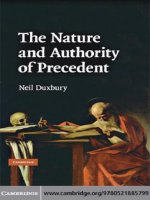cambridge university press the prisoners dilemma political economy and punishment in contemporary democracies jul 2008 kho tài liệu bách khoa
Bạn đang xem bản rút gọn của tài liệu. Xem và tải ngay bản đầy đủ của tài liệu tại đây (1.21 MB, 256 trang )
This page intentionally left blank
THE PRISONERS’ DILEMMA
Over the last two decades, in the wake of increases in recorded
crime and a cluster of other social changes, British criminal justice
policy has become increasingly politicised: both the scale and
intensity of punishment, and the significance of criminal justice
policy as an index of governments’ competence, have developed in
new and worrying ways. Across the Atlantic, we witness the
inexorable rise of the US prison population, amid a ratcheting up
of penal severity which seems unstoppable in the face of popular
anxiety about crime. But is this inevitable? Nicola Lacey argues that
harsh ‘penal populism’ is not the inevitable fate of all
contemporary democracies. Notwithstanding a degree of
convergence, ‘globalisation’ has left many of the key institutional
differences between national systems intact, and these help to
explain the striking differences in the capacity for penal
moderation of otherwise relatively similar societies. Only by
understanding the institutional preconditions for a tolerant
criminal justice system can we think clearly about the possible
options for reform within particular systems.
NICOLA LACEY is Professor of Criminal Law and Legal Theory
at the London School of Economics and Political Science. She is a
Fellow of the British Academy and an Honorary Fellow of New
College, Oxford.
T H E P R I S O N E R S’ DI L E M M A :
P O L I T I C A L EC O N O M Y
A N D PU N I S H M E N T I N
CONTEMPORARY
DEMOCRACIES
NICOLA LACEY
CAMBRIDGE UNIVERSITY PRESS
Cambridge, New York, Melbourne, Madrid, Cape Town, Singapore, São Paulo
Cambridge University Press
The Edinburgh Building, Cambridge CB2 8RU, UK
Published in the United States of America by Cambridge University Press, New York
www.cambridge.org
Information on this title: www.cambridge.org/9780521899475
© Nicola Lacey 2008
This publication is in copyright. Subject to statutory exception and to the provision of
relevant collective licensing agreements, no reproduction of any part may take place
without the written permission of Cambridge University Press.
First published in print format 2008
ISBN-13 978-0-511-41385-8
eBook (EBL)
ISBN-13 978-0-521-89947-5
hardback
ISBN-13 978-0-521-72829-4
paperback
Cambridge University Press has no responsibility for the persistence or accuracy of urls
for external or third-party internet websites referred to in this publication, and does not
guarantee that any content on such websites is, or will remain, accurate or appropriate.
CONTENTS
The Hamlyn Trust
The Hamlyn Lectures
List of figures
Preface
[vi]
[ix]
[xiii]
[xv]
Part I Punishment in contemporary democracies
[1]
1 ‘Penal populism’ in comparative perspective
[3]
2 Explaining penal tolerance and severity: criminal
justice in the perspective of political economy [55]
Part II Prospects for the future: escaping the
prisoners’ dilemma [113]
3 Inclusion and exclusion in a globalising world: is
penal moderation in co-ordinated market
economies under threat? [115]
4 Confronting the prisoners’ dilemma: the room
for policy manoeuvre in liberal market economies
Bibliography
Index
v
[225]
[207]
[170]
THE HAMLYN TRUST
The Hamlyn Trust owes its existence today to the will of the
late Miss Emma Warburton Hamlyn of Torquay, who died in
1941 at the age of eighty. She came of an old and well-known
Devon family. Her father, William Bussell Hamlyn, practised
in Torquay as a solicitor and JP for many years, and it seems
likely that Miss Hamlyn founded the trust in his memory.
Emma Hamlyn was a woman of strong character, intelligent
and cultured, well versed in literature, music and art, and a
lover of her country. She travelled extensively in Europe and
Egypt, and apparently took considerable interest in the law
and ethnology of the countries and cultures that she visited.
An account of Miss Hamlyn by Professor Chantal Stebbings of
the University of Exeter may be found, under the title ‘The
Hamlyn Legacy’, in volume 42 of the published lectures.
Miss Hamlyn bequeathed the residue of her estate on
trust in terms which it seems were her own. The wording was
thought to be vague, and the will was taken to the Chancery
Division of the High Court, which in November 1948
approved a Scheme for the administration of the trust.
Paragraph 3 of the Scheme, which follows Miss Hamlyn’s own
wording, is as follows:
The object of the charity is the furtherance by lectures or
otherwise among the Common People of the United
Kingdom of Great Britain and Northern Ireland of the
knowledge of the Comparative Jurisprudence and
vi
THE HAMLYN TRUST
Ethnology of the Chief European countries including the
United Kingdom, and the circumstances of the growth of
such jurisprudence to the Intent that the Common People
of the United Kingdom may realise the privileges which in
law and custom they enjoy in comparison with other
European Peoples and realising and appreciating such
privileges may recognise the responsibilities and
obligations attaching to them.
The Trustees are to include the Vice-Chancellor of the
University of Exeter, representatives of the Universities of
London, Leeds, Glasgow, Belfast and Wales and persons
co-opted. At present there are eight Trustees:
Professor N. Burrows, University of Glasgow
Professor I. R. Davies, Swansea University
Ms Clare Dyer
Professor K. M. Economides [representing the Vice-Chancellor
of the University of Exeter] (Chairman)
Professor R. Halson, University of Leeds
Professor J. Morison, Queen’s University, Belfast
The Rt Hon. Lord Justice Sedley
Professor A. Sherr, University of London
Clerk: Ms Charlotte Blackwell, University of Exeter
From the outset it was decided that the objects of the Trust
could be best achieved by means of an annual course of public
lectures of outstanding interest and quality by eminent
lecturers, and by their subsequent publication and distribution to a wider audience. The first of the Lectures were
delivered by the Rt Hon. Lord Justice Denning (as he then
vii
THE HAMLYN TRUST
was) in 1949. Since then there has been an unbroken series of
annual Lectures published until 2005 by Sweet & Maxwell and
from 2006 by Cambridge University Press. A complete list of
the Lectures may be found on pages ix to xii. In 2005 the
Trustees decided to supplement the Lectures with an annual
Hamlyn Seminar, normally held at the Institute of Advanced
Legal Studies in the University of London, to mark the
publication of the Lectures in printed book form. The
Trustees have also, from time to time, provided financial
support for a variety of projects which, in various ways, have
disseminated knowledge or have promoted to a wider public
understanding of the law.
This, the 59th series of lectures, was delivered by
Professor Nicola Lacey, FBA at the University of Leeds, the
University of Liverpool and the London School of Economics and Political Science in late November and early
December 2007. The Board of Trustees would like to record
its appreciation to Professor Lacey and also to the three
University law schools which generously hosted these
Lectures.
January 2008
KIM ECONOMIDES
Chairman of the Trustees
viii
THE HAMLYN LECTURES
1949
Freedom under the Law by the Rt Hon. Lord Denning
1950
The Inheritance of the Common Law by Richard
O’Sullivan
1951
The Rational Strength of English Law by Professor
F. H. Lawson
1952
English Law and the Moral Law by Professor A. L.
Goodhart
1953
The Queen’s Peace by Sir Carleton Kemp Allen
1954
Executive Discretion and Judicial Control by Professor
C. J. Hamson
1955
The Proof of Guilt by Professor Glanville Williams
1956
Trial by Jury by the Rt Hon. Lord Devlin
1957
Protection from Power under English Law by the Rt
Hon. Lord MacDermott
1958
The Sanctity of Contracts in English Law by Professor
Sir David Hughes Parry
1959
Judge and Jurist in the Reign of Victoria by C. H. S. Fifoot
1960
The Common Law in India by M. C. Setalvad
1961
British Justice: The Scottish Contribution by Professor
Sir Thomas Smith
1962
Lawyer and Litigant in England by the Rt Hon. Sir
Robert Megarry
1963
Crime and the Criminal Law by the Baroness Wootton
of Abinger
ix
THE HAMLYN LECTURES
1964
1965
1966
1967
1968
1969
1970
1971
1972
1973
1974
1975
1976
1977
1978
1979
Law and Lawyers in the United States by Dean Erwin
N. Griswold
New Law for a New World? by the Rt Hon. Lord
Tanley
Other People’s Law by the Rt Hon. Lord Kilbrandon
The Contribution of English Law to South African
Law: and the Rule of Law in South Africa by the
Hon. O.D. Schreiner
Justice in the Welfare State by Professor H. Street
The British Tradition in Canadian Law by the Hon.
Bora Laskin
The English Judge by Henry Cecil
Punishment, Prison and the Public by Professor Sir
Rupert Cross
Labour and the Law by Professor Sir Otto KahnFreund
Maladministration and its Remedies by Sir Kenneth
Wheare
English Law – the New Dimension by the Rt Hon.
Lord Scarman
The Land and the Development; or, The Turmoil and
the Torment by Sir Desmond Heap
The National Insurance Commissioners by Sir Robert
Micklethwait
The European Communities and the Rule of Law by
Lord Mackenzie Stuart
Liberty, Law and Justice by Professor Sir Norman
Anderson
Social History and Law Reform by Professor Lord
McGregor of Durris
x
THE HAMLYN LECTURES
1980
Constitutional Fundamentals by Professor Sir William
Wade
1981
Intolerable Inquisition? Reflections on the Law of Tax
by Hubert Monroe
1982
The Quest for Security: Employees, Tenants, Wives by
Professor Tony Honore´
1983
Hamlyn Revisited: The British Legal System Today by
Lord Hailsham of St Marylebone
1984
The Development of Consumer Law and Policy – Bold
Spirits and Timorous Souls by Sir Gordon Borrie
1985
Law and Order by Professor Ralf Dahrendorf
1986
The Fabric of English Civil Justice by Sir Jack Jacob
1987
Pragmatism and Theory in English Law by P. S. Atiyah
1988
Justification and Excuse in the Criminal Law by J. C.
Smith
1989
Protection of the Public – A New Challenge by the
Rt Hon. Lord Justice Woolf
1990
The United Kingdom and Human Rights by Dr Claire
Palley
1991
Introducing a European Legal Order by Gordon Slynn
1992
Speech and Respect by Professor Richard Abel
1993
The Administration of Justice by Lord Mackay of
Clashfern
1994
Blackstone’s Tower: The English Law School by
Professor William Twining
1995
From the Test Tube to the Coffin: Choice and
Regulation in Private Life by the Hon. Mrs Justice Hale
1996
Turning Points of the Common law by the Rt Hon. The
Lord Cooke of Thorndon
xi
THE HAMLYN LECTURES
1997
1998
1999
2000
2001
2002
2003
2004
2005
2006
Commercial Law in the Next Millennium by Professor
Roy Goode
Freedom Law and Justice by the Rt Hon. Lord Justice
Sedley
The State of Justice by Michael Zander QC
Does the United Kingdom still have a Constitution?
by Anthony King
Human Rights, Serious Crime and Criminal
Procedure by Andrew Ashworth QC
Legal Conundrums in our Brave New World by
Baroness Kennedy of the Shaws
Judicial Activism by the Hon. Justice Michael Kirby
AC CMG
Rights at Work: Global, European and British
Perspectives by Sir Bob Hepple QC, FBA
Can Human Rights Survive? by Conor Gearty
The Sovereignty of Law: The European Way by Sir
Francis Jacobs KCMG, QC
xii
FIGURES
1 Political economy, imprisonment and
homicide [60]
2 Institutional linkages in political-economic
systems [62]
3 Inequality and redistribution, c. 1970–95 [80]
4 Vocational training and redistribution [81]
5 Literacy and education, 1994–8 [82]
6 Causal relationships between institutional
variables [90]
7 European political economies and imprisonment [110]
8 Political economy and imprisonment [111]
9 Co-ordination and imprisonment [111]
10 Prison population rates, 2004 [120]
11 The incarceration rate of African Americans in
the USA [125]
12 Men in the USA with prison records by age 30–4 [126]
13 Imprisonment trends in Europe, 1950–2006 [139]
14 Imprisonment trends in Europe and the USA,
1950–2006 [140]
15 Imprisonment projection (based on 2000–6) [141]
16 Crime and incarceration in the USA, 1987–2005 [171]
xiii
PREFACE
It is generally agreed that the humanity, fairness and
effectiveness with which governments manage their criminal
justice systems is a key index of the state of a democracy. But
constraints on the realisation of democratic values and
aspirations in criminal justice are markedly variable across
time and space. In the last three decades, in the wake of both
increases in recorded crime and a cluster of cultural and
economic changes, British criminal justice policy has become
increasingly politicised: both the scale and intensity of
criminalisation and the salience of criminal justice policy as
an index of governments’ competence have developed in new
and, to many commentators, worrying ways. These developments have been variously characterised as the birth of a
‘culture of control’ and a tendency to ‘govern through
crime’; as a turn towards an ‘exclusive society’ focused on the
perceived risks to security presented by particular groups.
Across the Atlantic, we witness the inexorable rise of the US
prison population, amid a ratcheting up of penal severity
which seems unstoppable in the face of popular anxiety
about crime. In the context of globalisation, the general, and
depressing, conclusion seems to be that, notwithstanding
significant national differences, contemporary democracies
are constrained to tread the same path of ‘penal populism’,
albeit that their progress along it is variously advanced. A
substantial scaling down of levels of punishment and
xv
PREFACE
criminalisation is regarded as politically impossible, the
optimism of penal welfarism a thing, decisively, of the past.
The rehabilitative ideals eloquently defended in Barbara
Wootton’s Hamlyn lectures of 1963, reflected in the humane
optimism and turn to non-custodial penalties advocated by
Rupert Cross’s lectures of 1971, seem distant echoes of a lost
world, and Ralf Dahrendorf’s more pessimistic diagnosis in
1985 of a ‘law and order’ problem rooted in emerging
features of economy and society seems nearer the mark for
the new millennium.
But is this dystopian vision convincing? Does it
characterise every country? And, to the extent that it holds
true, is it inevitable?
In this book, I set the nature and genesis of criminal
justice policy in Britain and the USA within a comparative
perspective, in order to make the case for thinking that, far
from being invariable or inevitable, the rise of penal populism
does not characterise all ‘late modern’ democracies. Rather,
certain features of social, political and economic organisation
favour or inhibit the maintenance of penal tolerance and
humanity in punishment. I argue that, just as it is wrong to
suppose that crime can be tackled in terms of criminal justice
policy alone, it is equally erroneous to think that criminal
justice policy is an autonomous area of governance. Rather,
both the capacities that governments possess to develop and
implement criminal justice policies, and the constraints under
which they do so, are a function not only of perceived crime
problems or the cultural norms or macro-economic forces
that surround them but also of a cluster of institutional factors
distinctive to particular political and economic systems.
xvi
PREFACE
Notwithstanding a degree of convergence, so-called ‘globalisation’ has left many of the key institutional differences
between advanced democracies intact, and these may help to
explain the striking differences in crime levels, penal severity
and capacity for penal tolerance in otherwise relatively similar
societies. Only by understanding the institutional preconditions for a tolerant criminal justice system, I argue, can we
think clearly about the possible options for reform within the
British system.
In making this argument, I fear that I may be causing
some unease to the shade of Emma Hamlyn, to whose
foresight and generosity the lecture series in which this book
originates is due. The charitable object of her bequest was
the furtherance . . . among the Common People of the
United Kingdom of Great Britain and Northern Ireland of
the knowledge of the Comparative Jurisprudence and the
Ethnology of the chief European countries including the
United Kingdom, and the circumstances of the growth of
such jurisprudence to the Intent that the Common People of
the United Kingdom may realise the privileges which in law
and custom they enjoy in comparison with other European
Peoples and realising and appreciating such privileges may
recognise the responsibilities and obligations attaching to
them.
My story is not a story of the superiority of British laws and
customs as compared with those elsewhere in Europe: indeed,
I will argue that certain features of Scandinavian and northern
European systems have accorded them some advantages in the
quest to maintain humanity and moderation in punishment.
xvii
PREFACE
But I like to think that a woman who had the vision to leave
part of her estate for the purposes of public education would
have appreciated the importance of our being alive not only to
our distinctive privileges, but to some of the pitfalls to which
the distinctive structure of our legal, political and economic
system may expose us. For this awareness, surely, bears with
equal force on the rights and responsibilities of members of
the polity with which Miss Hamlyn was concerned. I am, of
course, delighted to have this opportunity of honouring her
enlightened generosity, as well as of expressing my gratitude
to the Hamlyn Trustees for doing me the honour of placing
their confidence in me through their invitation to give the
2007 lectures.
Kim Economides, Chair of the Trustees, gave me
advice throughout the planning process, and I would like to
thank him and his fellow trustees – particularly Clare Dyer
and Stephen Sedley – for their support during the preparation
of the lectures. I would also like to thank Adam Crawford,
Dominic McGoldrick and Stephen Sedley for chairing the
lectures, and for doing so in such a generous way. I am grateful
to the Universities of Leeds and Liverpool, as well as to my
‘home base’ of LSE, for hosting the lectures, and to Adam
Crawford, Roger Halson, Anu Arora, Dominic McGoldrick
and Hugh Collins for giving me a warm welcome on each
occasion. Behind the scenes, but no less importantly, Bradley
Barlow, Charlotte Blackwell, Kayte Kelly and Joy Whyte did a
huge amount to make the lecture series run smoothly, and my
warm thanks go to them, too.
In preparing the lectures and book, I have been
fortunate to have the advice and support of many friends
xviii
PREFACE
and colleagues across a number of disciplines. First and
foremost, I owe a large debt of gratitude to David Soskice:
for stimulating my original interest in comparative issues, for
extensive discussion of the arguments of the book, and for
providing – in his own development of comparative political
economy and in his work with a number of political science
colleagues, notably Peter A. Hall and Torben Iversen – the
theoretical backbone of my argument. Without his inspiration and support, this project would never have got off the
ground. This book is dedicated to him, with my love, thanks
and admiration.
I am also grateful to Leo Halepli (who prepared many
of the tables which appear in the book) and to Arlie
Loughnan for exemplary research assistance; to the participants at a conference on ‘Punishment and Democracy’ at the
University of Warsaw, at a meeting of the LSE Criminal Law
and Social Theory group, at the Barbara Betcherman Lecture
at Osgoode Hall Law School, at a visiting fellows’ seminar at
the Center for European Studies, Harvard University, and at a
workshop on ‘Regulating Deviance’ at the International
Institute for the Sociology of Law, Onati, Spain for helpful
feedback; and to Michael Cavadino, James Dignan, Peter A.
Hall, Torben Iversen, John Pratt, David Soskice and Bruce
Western for permission to reproduce or adapt tables from
their own work. James Dignan, David Downes, David
Garland, John Pratt, Robert Reiner, Michael Tonry and Lucia
Zedner were kind enough to read a complete draft: each of
them gave me invaluable comments. I would like to make
special mention of the intellectual support and advice which I
have had from my LSE colleagues Ely Aharonson, David
xix
PREFACE
Downes, Manuel Iturralde, Leo Halepli, Bob Hancke: , Tim
Newburn, Peter Ramsay, Robert Reiner and Michael Zander;
the length of this list, and the number of departments which it
spans, underline why LSE is such a marvellous place to work. I
have also had generous advice and feedback from John
Braithwaite, Alison Cottrell, Thomas R. Cusack, Arie Freiburg, Andrew Glyn, Peter A. Hall, Douglas Hay, Kirstine
Hansen, Andrew Martin, Dario Melossi, Alan Norrie, John
Pratt, Joe Sim, Rosemary Taylor, Kathleen Thelen, Omar
Wasow and Martin Wright. My warm thanks go to all these
people, as well as to the incomparable Finola O’Sullivan (who
generously attended all three lectures and gave me immeasurable encouragement ‘on the road’) and her colleagues at
Cambridge University Press, with whom it has been an
unmitigated pleasure to work; and to the three anonymous
readers for Cambridge University Press, who gave invaluable
feedback. I would also like to thank the many family and
friends who came to the lectures, and, in particular, my
mother, Gill McAndrew, who did so much to give me support
through the time of writing and delivering them.
Last but by no means least: without the privilege of a
Leverhulme Trust Major Research Fellowship, my other
commitments would have made it impossible for me to take
up the Hamlyn Trustees’ invitation. I acknowledge the
Leverhulme Trust’s generosity with pleasure, and with the
deepest gratitude.
Nicola Lacey
xx
PART I
Punishment in contemporary
democracies
1
‘Penal populism’ in comparative
perspective
The state of criminal justice – the scope and content of
criminal law, the performance of criminal justice officials,
public attitudes to crime, and the extent and intensity of
the penal system – is often used as a broad index of how
‘civilised’, ‘progressive’, or indeed ‘truly democratic’ a
country is. A classic expression of this idea is that of Winston
Churchill, who commented nearly a century ago that,
The mood and temper of the public in regard to the
treatment of crime and criminals is one of the most
unfailing tests of the civilisation of any country. A calm,
dispassionate recognition of the rights of the accused,
and even of the convicted criminal – a constant
heart-searching by all charged with the duty of
punishment – a desire and eagerness to rehabilitate in
the world of industry those who have paid their due in the
hard coinage of punishment: tireless efforts towards the
discovery of curative and regenerative processes: unfailing
faith that there is a treasure, if you can only find it, in the
heart of every man. These are the symbols which, in the
treatment of crime and criminal, mark and measure
the stored-up strength of a nation and sign and proof
of the living virtue in it.1
1
Winston Churchill, in the House of Commons, 25 July 1910.
3









